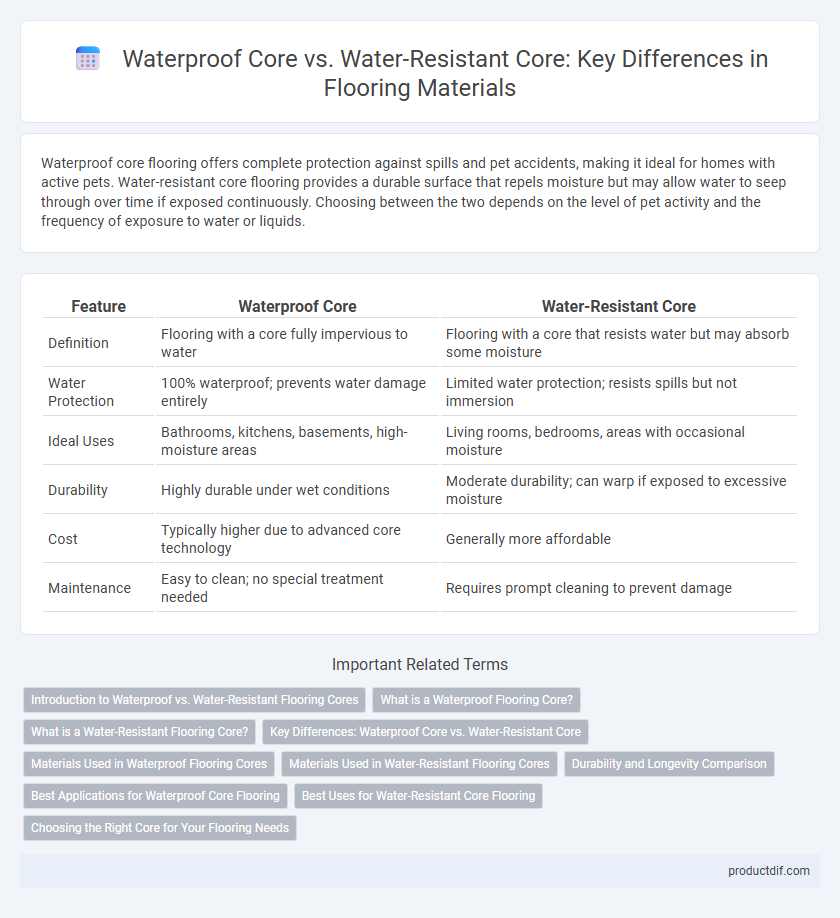Waterproof core flooring offers complete protection against spills and pet accidents, making it ideal for homes with active pets. Water-resistant core flooring provides a durable surface that repels moisture but may allow water to seep through over time if exposed continuously. Choosing between the two depends on the level of pet activity and the frequency of exposure to water or liquids.
Table of Comparison
| Feature | Waterproof Core | Water-Resistant Core |
|---|---|---|
| Definition | Flooring with a core fully impervious to water | Flooring with a core that resists water but may absorb some moisture |
| Water Protection | 100% waterproof; prevents water damage entirely | Limited water protection; resists spills but not immersion |
| Ideal Uses | Bathrooms, kitchens, basements, high-moisture areas | Living rooms, bedrooms, areas with occasional moisture |
| Durability | Highly durable under wet conditions | Moderate durability; can warp if exposed to excessive moisture |
| Cost | Typically higher due to advanced core technology | Generally more affordable |
| Maintenance | Easy to clean; no special treatment needed | Requires prompt cleaning to prevent damage |
Introduction to Waterproof vs. Water-Resistant Flooring Cores
Waterproof flooring cores are engineered with materials such as rigid vinyl or WPC (wood plastic composite) that prevent any water penetration, making them ideal for wet areas like bathrooms and kitchens. Water-resistant cores, often constructed from HDF (high-density fiberboard) with protective coatings, can withstand minor spills and moisture but are vulnerable to prolonged water exposure. Choosing between waterproof and water-resistant flooring cores depends on the specific moisture conditions and durability requirements of the installation environment.
What is a Waterproof Flooring Core?
A waterproof flooring core is engineered from materials such as rigid vinyl or stone plastic composite (SPC) that prevent water penetration and resist moisture damage. This type of core ensures the flooring remains stable and intact in high-humidity environments or areas prone to spills, such as bathrooms and kitchens. Unlike water-resistant cores that only limit water absorption, waterproof cores provide a complete barrier against water infiltration.
What is a Water-Resistant Flooring Core?
A water-resistant flooring core is designed to repel moisture and reduce water absorption, typically constructed from high-density fiberboard (HDF) treated with sealants or protective coatings. Unlike waterproof cores that block water entirely, water-resistant cores withstand occasional spills and humidity but may be vulnerable to prolonged exposure. This type of core enhances durability and stability in environments with moderate moisture, such as kitchens and bathrooms.
Key Differences: Waterproof Core vs. Water-Resistant Core
Waterproof core flooring features a dense, impervious core material, typically made from stone plastic composite (SPC) or wood plastic composite (WPC), designed to completely block water penetration and prevent swelling or warping. Water-resistant core flooring, often constructed from high-density fiberboard (HDF) with a protective coating, offers limited protection by repelling moisture but may absorb water over extended exposure, risking damage. The primary difference lies in waterproof cores providing full water protection suitable for high-moisture areas, while water-resistant cores are better for occasional spills and damp environments.
Materials Used in Waterproof Flooring Cores
Waterproof flooring cores commonly use materials such as stone polymer composite (SPC) and wood plastic composite (WPC) that provide excellent moisture resistance and stability. SPC cores consist of limestone and vinyl, offering a rigid and durable base impervious to water, while WPC cores combine wood fibers with plastic polymers for enhanced comfort and flexibility. These materials ensure superior protection against water damage compared to traditional water-resistant cores, which typically use high-density fiberboard (HDF) with water-repellent coatings.
Materials Used in Water-Resistant Flooring Cores
Water-resistant flooring cores commonly utilize high-density fiberboard (HDF) treated with water-repellent resins or composite materials incorporating polymers such as polypropylene. These materials enhance moisture resistance while maintaining structural integrity and impact durability. Unlike waterproof cores made from extruded polymer cores (EPC) or stone polymer composites (SPC), water-resistant cores balance cost-effectiveness with moderate water protection suitable for low-moisture areas.
Durability and Longevity Comparison
Waterproof core flooring, typically constructed with impermeable materials like vinyl or WPC (wood plastic composite), offers superior durability by preventing water infiltration entirely, significantly reducing risks of warping, swelling, and mold growth. In contrast, water-resistant core flooring provides moderate protection by resisting moisture penetration to a degree, but prolonged exposure can still lead to structural damage and a shorter lifespan. Choosing waterproof core flooring ensures enhanced longevity, especially in high-moisture environments such as bathrooms and kitchens.
Best Applications for Waterproof Core Flooring
Waterproof core flooring is ideal for high-moisture environments such as bathrooms, kitchens, and basements where standing water or frequent spills occur. Engineered with a non-porous core like WPC (Wood Plastic Composite) or SPC (Stone Plastic Composite), it prevents water penetration and warping, ensuring long-term durability. This makes it the best choice for commercial spaces, laundry rooms, and mudrooms requiring superior water protection.
Best Uses for Water-Resistant Core Flooring
Water-resistant core flooring excels in environments with occasional moisture exposure, such as kitchens, entryways, and basements, providing reliable protection against spills and humidity. It features a core composition designed to resist water penetration while maintaining structural integrity, making it suitable for areas prone to dampness but not constant water submersion. Homeowners seeking durable flooring with enhanced moisture defense without the cost of fully waterproof materials will find water-resistant core flooring an ideal choice for moderate moisture zones.
Choosing the Right Core for Your Flooring Needs
Waterproof core flooring features a dense, impermeable core that prevents water from penetrating, making it ideal for high-moisture areas like bathrooms and basements. Water-resistant core flooring offers limited moisture protection by resisting surface spills but may not withstand prolonged exposure to water, suitable for kitchens and living rooms. Selecting the right core depends on the room's moisture exposure, with waterproof cores providing superior durability and longevity in wet environments.
Waterproof Core vs Water-Resistant Core Infographic

 productdif.com
productdif.com